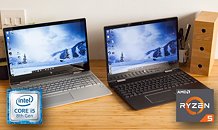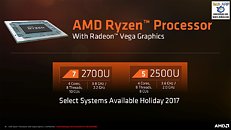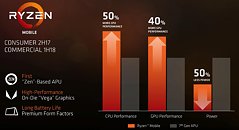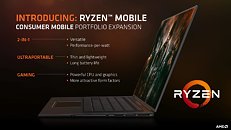Wednesday, February 28th 2018

Dell CTO On AMD-Powered Products: "Don't Expect a [Intel and AMD] Duopoly"
AMD has been making waves on computing markets with its latest line of processors powered by its innovative Zen microarchitecture. Its strengths and weaknesses are very well known by now, so there's no use harking them all over again; suffice it to say that the company has regained competitiveness - and then some - with many of Intel's products in as many different industry sectors. The company's APU solutions, for one, are one of a kind solutions that allow users to do some very impressive gaming sans a discrete GPU. However, Intel's been spending the last several years before AMD's Zen entrenching themselves in all markets, so AMD clearly has an uphill battle in fighting existing relations and supply channels. Case in point: Dell.
Channel Pro is reporting that Dell EMC's CTO, John Roese, said today at WMC that "Intel is the big player, AMD is the second player. There's enough diversity between them that there are use cases to have them both in our portfolio, but just the sheer breadth of the Intel processor portfolio is massive compared to even the accelerated AMD world."While the executive tips his hat to AMD's recent product launches and forays into products that customers actually desire to have in their computing world, but thinks that that alone isn't enough: "AMD is doing some interesting things, and by adding them to the portfolio we pick up a few extra areas, but let's be very clear: there is a huge, dominant player in compute semiconductors, and then there is a challenger which is doing some very good innovative work called AMD, but the gap between them is quite large in terms of market share and use-cases. So our portfolio is not going to change in any meaningful way." he then finished with a coup-de-grace, saying that users shouldn't "(...) expect it [Dell's portfolio] ]to be a duopoly any time soon." Talk about rewarding the striving underdog.
Source:
ChannelPro.co.uk
Channel Pro is reporting that Dell EMC's CTO, John Roese, said today at WMC that "Intel is the big player, AMD is the second player. There's enough diversity between them that there are use cases to have them both in our portfolio, but just the sheer breadth of the Intel processor portfolio is massive compared to even the accelerated AMD world."While the executive tips his hat to AMD's recent product launches and forays into products that customers actually desire to have in their computing world, but thinks that that alone isn't enough: "AMD is doing some interesting things, and by adding them to the portfolio we pick up a few extra areas, but let's be very clear: there is a huge, dominant player in compute semiconductors, and then there is a challenger which is doing some very good innovative work called AMD, but the gap between them is quite large in terms of market share and use-cases. So our portfolio is not going to change in any meaningful way." he then finished with a coup-de-grace, saying that users shouldn't "(...) expect it [Dell's portfolio] ]to be a duopoly any time soon." Talk about rewarding the striving underdog.




43 Comments on Dell CTO On AMD-Powered Products: "Don't Expect a [Intel and AMD] Duopoly"
A well, during what you said as a time where most capacitors had that problem: I am not 100% sure and I apologize if I am spreading misinformation, but I also do not remember having issue with any of the offices HP machines ever having said issue while our dells did. Could be coincidence, I am not sure. I just never liked dealing with dell. Things may be different now, but I don't know, haven't had to use their services in at least a couple years now.
But I am interested in their XPS machines and or Alienware builds that are heavily discounted. Those from what I see are rather solid machines.
The statement you replied to, saying "Ultra-light and portables is still Intel's domain as well" is both a statement of (market) fact (and thus relevant to the discussion) and predictive (at least for the short term) with regard to AMD's seeming battery life deficiency, to which your statement doesn't add anything at all. Embedded is in no way applicable in this case (doesn't apply to consumer products outside of weirdo edge cases like the Smach Z), and you don't address battery life/power draw at all. As such: you're veering off into "who has the fastest part" discussions, which - again - I don't see as applicable to this thread. You're welcome to disagree, but I'd like some explanation as to how, then.
Try to not take this post as a personal insult, there really is nothing directed at you (or anyone else for that matter).
I'm really not sure how you're reading my post as taking anything personally - I was simply trying to explain how I didn't see your line of argumentation as applicable to this thread. You've explained your reasoning, which is appreciated even if I still disagree. I suppose we should leave it at that, as my whole point was that this is not the thread to get into technical stuff or the actual merits of various chips, but rather a thread for discussing the seemingly shady business practices and anti-competitive attitudes seen in that statement. A topic that we've long since veered off.Hm. Thanks for letting me know, 'cause I sure hadn't noticed that I was. Real insightful of you.
If 9th gen is going to be Skylake again, it's 4th time with same arch and 5th release on 14nm... INSANE...